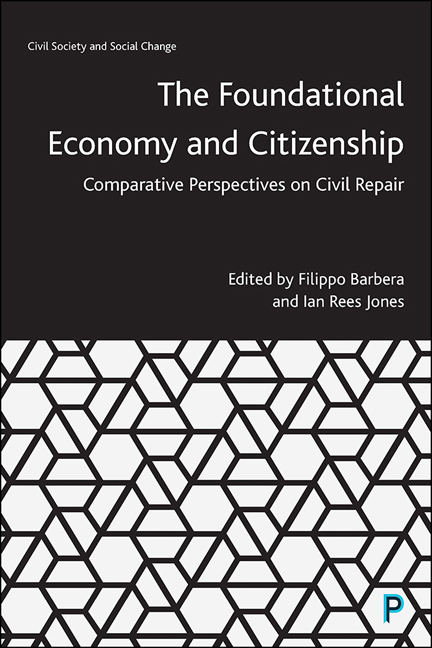Book contents
- Frontmatter
- Contents
- List of Figures and Tables
- Notes on the Editors and Contributors
- Acknowledgements
- Introduction
- 1 The Foundational Economy and the Civil Sphere
- PART I Governance and Public Action
- PART II Housing and Urban Life
- PART III Water and Waste
- PART IV Food
- Conclusions and new policy directions
- Index
7 - Waste Management and Value Extraction in Italy: Where is the Citizen? Waste to Worth
Published online by Cambridge University Press: 12 March 2021
- Frontmatter
- Contents
- List of Figures and Tables
- Notes on the Editors and Contributors
- Acknowledgements
- Introduction
- 1 The Foundational Economy and the Civil Sphere
- PART I Governance and Public Action
- PART II Housing and Urban Life
- PART III Water and Waste
- PART IV Food
- Conclusions and new policy directions
- Index
Summary
Introduction
The discourse about waste as a resource has become widespread among public opinion since the 2000s. Nowadays this rhetoric seems to be part of common sense, drifting into the public realm from institutional declarations that inspired policies about waste management. For instance, in 2014 the European Environment Agency (EEA) published an article that stressed how the shift from considering waste as a problem to waste as a resource was urgent and mandatory (EEA, 2014). In order to address the ‘economic loss’ and to rationalize the ‘management costs’ of waste, a ‘roadmap to a resource-efficient Europe’ was being developed. Likewise in Italy, the current discussion about the development of the circular economy is deeply rooted in this idea of exploiting waste according to the repeatability of the nexus between raw materials, production, use (that is consumption) and recycling. In 2017 the Ministry for the Environment, Land Protection and Sea and the Ministry of Economic Development released a report outlining the Italian strategy after the United Nations (UN) Paris Agreement and other international meetings on climate change. The strategy had a clearly stated aim, to ‘rethink our means of production and consumption, develop new models of business and transform waste in high added value resources; we need technologies, processes, services and creative models of entrepreneurship to shape our economy and society’ (MATTM and MISE, 2017: 5; translated from Italian).
There is an ambiguity in this general argument about waste as a resource because this word is often understood basically in economic terms (economic loss, in the above-mentioned case). How this ambiguity has become well established is also evident if we consider the efforts in research and theoretical speculations concerning the interplay between money flow and waste, both at local and global levels. Referring to the works of Urry (2002) and Gereffi (1994), Fagan (2002: 5) described his project of a sociology of waste flow, stating that ‘The environmental/waste issue, while it can be seen to be subject to commodity chains is perhaps best conceptualized as a “global fluid” […]. Money is one such flow but so also is waste: the first is visible, productive and well researched; the latter is usually invisible (mostly hidden), deemed unproductive and certainly not well researched.’
- Type
- Chapter
- Information
- The Foundational Economy and CitizenshipComparative Perspectives on Civil Repair, pp. 159 - 180Publisher: Bristol University PressPrint publication year: 2020



